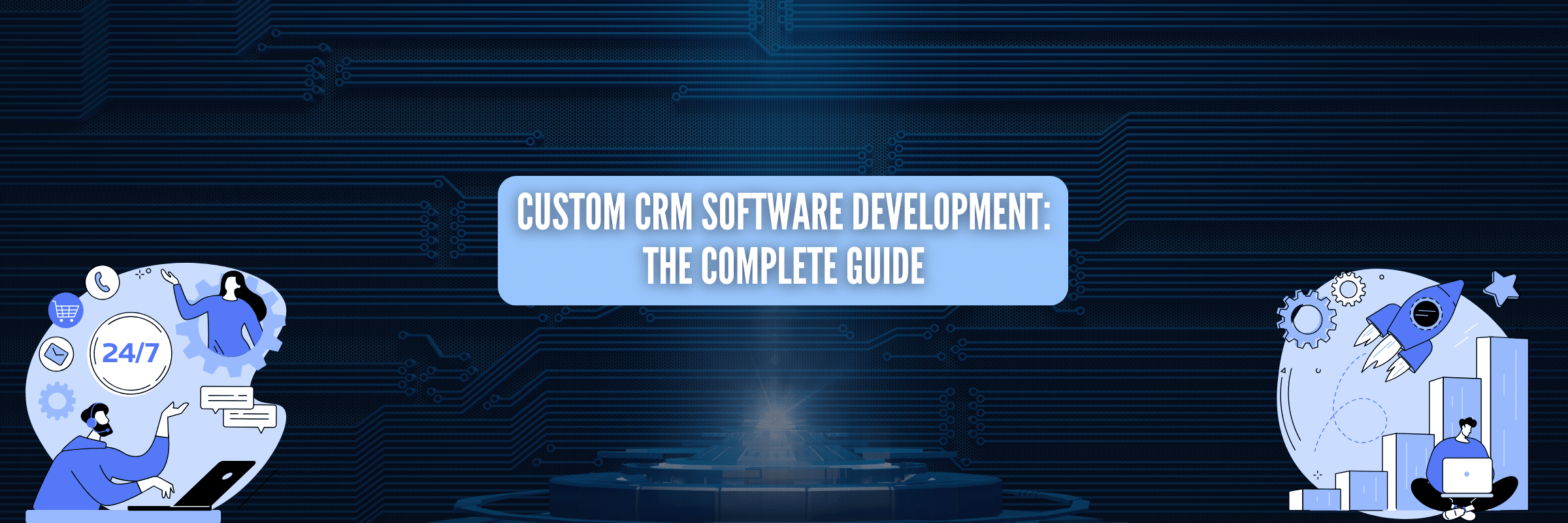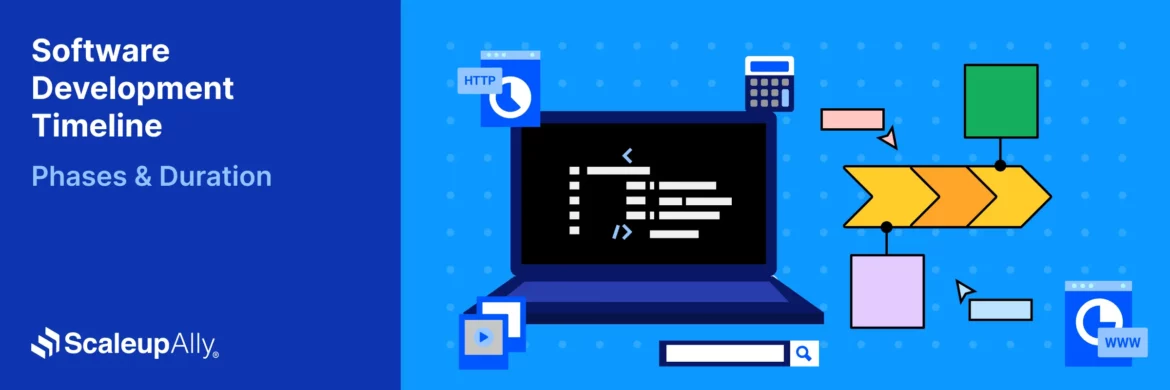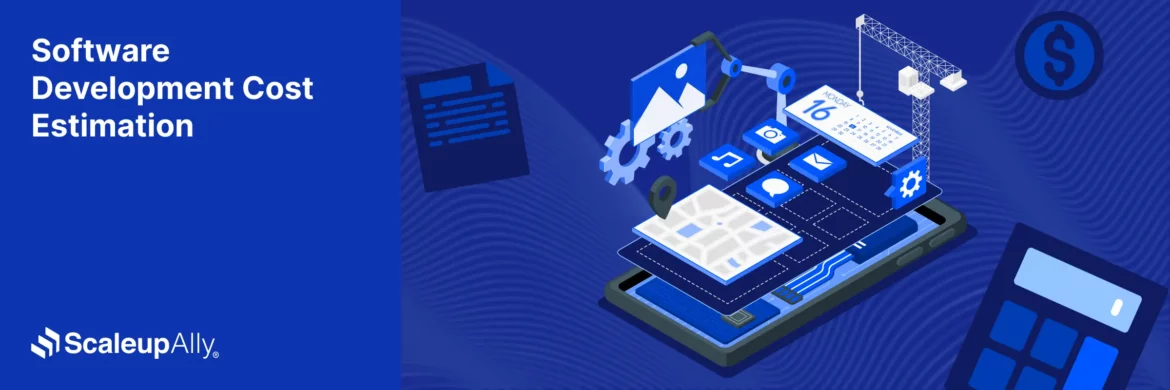
Custom CRM Software Development: The Complete Guide
Suprabhat Sen | June 1, 2024 , 14 min read
Table Of Content
Are you struggling to wrangle customer data across spreadsheets and cobbled-together systems? Feeling like your CRM is hindering your sales instead of helping them soar?
That’s where custom CRM software development comes in. This comprehensive guide will equip you with everything you need to know about building a custom CRM system, from defining your goals to selecting the right software development company and navigating the development process itself. Let’s take your customer interactions to the next level.
Key Takeaways
- Custom CRM offers tailored workflows, scalability, and full data control, making it ideal for businesses with unique needs.
- Market-ready CRM solutions provide quick deployment, affordability, and vendor support but with limited customization options.
- Operational CRM automates routine sales, marketing, and customer service tasks to boost efficiency and centralize customer data.
- Analytical CRM provides in-depth insights on customer behavior, campaign success, and sales forecasts for data-driven strategies.
- Collaborative and strategic CRMs enhance cross-department communication and align customer management with long-term business goals.
What is CRM Development?
CRM development involves creating and implementing a Customer Relationship Management (CRM) system. A CRM system is a tool used by businesses to manage interactions with current and potential customers. It helps streamline processes, improve customer service, and increase profitability by organizing and automating customer-facing business functions like sales, marketing, and customer support.
Custom CRM System Vs Market-Ready Solution: What to Choose?
When it comes to managing customer relationships, both custom CRM systems and market-ready solutions offer powerful tools. But choosing the right champion for your business depends on the fight you’re in. We will help you size up each contender and determine the right one for your business.
Custom CRM
Imagine a CRM system built to your exact specifications, a tireless teammate that anticipates your every move. That’s the power of custom CRM.
Strengths:
- Perfect Fit: Custom CRMs are tailored to your unique workflows, data needs, and integrations. No more wrestling with features you don’t need or struggling to make generic functionalities work for you.
- Scalability: As your business grows and evolves, your custom CRM can adapt and expand with you.
- Security and Control: You have complete control over your data and security measures.
Weaknesses:
- Cost: Developing a custom CRM requires a significant upfront investment in time and resources.
- Time to Market: Building a CRM from scratch takes longer than deploying a market-ready solution.
- Maintenance: Ongoing maintenance and updates are your responsibility.
Market-Ready Solution
Market-ready CRM solutions are pre-built systems packed with features designed for a broad range of businesses. They offer a quick and cost-effective way to get started.
Strengths:
- Affordability: Market-ready solutions typically have lower upfront costs and often offer subscription-based pricing.
- Fast Deployment: You can be up and running quickly with minimal setup time.
- Vendor Support: Many vendors offer ongoing support and updates.
Weaknesses:
- Limited Customization: You may not be able to fully customize the system to fit your specific needs.
- Integration Challenges: Integrating with existing systems might require additional work or be limited.
- Scalability Concerns: As your needs grow complex, the system may not adapt as seamlessly.
So, who wins the fight?
It depends on your business priorities. If you have unique needs, require high customization, and value long-term scalability, a custom CRM might be the better choice. However, if you need a quick and affordable solution to get started, a market-ready CRM could be a solid contender.
Types of CRM Systems
Understanding the different types of CRM systems is crucial for crafting the ideal solution for your business. Here’s a breakdown of the key players:
1. Operational CRM
This CRM focuses on automating and streamlining everyday tasks related to sales, marketing, and customer service. It handles:
- Contact Management: Storing and organizing customer data, including contact information, interactions, and purchase history.
- Sales Automation: Managing sales pipelines, automating tasks, and tracking opportunities.
- Marketing Automation: Segmenting customer lists, launching targeted campaigns, and tracking campaign performance.
- Customer Service Automation: Ticketing systems, knowledge base management, and self-service portals.
An operational CRM is ideal for businesses that want to improve efficiency, boost productivity, and gain a centralized view of customer interactions.
2. Analytical CRM
This CRM goes beyond managing day-to-day tasks. It delves into customer data to uncover hidden insights and trends. Think of it as your business analyst, providing valuable intel like:
- Customer Segmentation: Identifying different customer groups based on behavior, demographics, or purchase history.
- Customer Lifetime Value (CLV): Analyzing the total revenue a customer generates over their relationship with your business.
- Campaign Performance Analysis: Measuring the effectiveness of marketing campaigns and identifying areas for improvement.
- Sales Forecasting: Predicting future sales based on historical data and current trends.
An analytical CRM empowers businesses to make data-driven decisions, personalize marketing efforts, and optimize sales strategies.
3. Collaborative CRM
This CRM emphasizes communication and collaboration between different departments, fostering a unified customer experience. Think of it as your communication hub, facilitating seamless interaction between:
- Sales & Marketing: Sharing customer insights and aligning sales & marketing strategies.
- Sales & Customer Service: Ensuring everyone has access to the latest customer information and interaction history.
- Customer Service & Other Departments: Empowering customer service reps to resolve issues efficiently by collaborating with other departments.
A collaborative CRM breaks down silos and fosters a team-oriented approach to customer relationship management, leading to improved customer satisfaction and loyalty.
4. Strategic CRM
This CRM focuses on aligning customer interactions with your overall business strategy. Think of it as your strategic advisor, helping you define and achieve long-term goals like:
- Customer Acquisition Strategies: Identifying and targeting high-value customers.
- Customer Retention Programs: Developing strategies to retain existing customers and increase their lifetime value.
- Market Analysis: Identifying new market opportunities and customer segments.
By connecting customer data with your business goals, a strategic CRM helps you make informed decisions to optimize customer relationships and drive long-term business success.
The best CRM type (or even a combination) depends on your specific needs and goals. Understanding these different CRM types, you can develop a custom CRM solution that empowers your business to build stronger customer relationships and achieve lasting success.
Things to consider for Custom CRM App Development
Congratulations! You’ve decided to develop a custom CRM app. But before the development, there are some essential elements to consider to ensure your CRM is the best and meets your needs. Here are some key factors to keep in mind:
1. Identifying Your Needs
- Business Goals: What are your overarching objectives for customer relationship management? Increased sales, improved customer retention, or enhanced data-driven decision-making?
- User Needs: Who will be using the CRM? Sales reps, marketing teams, or customer service agents? Understanding their workflows and pain points is crucial.
- Data Requirements: What customer data do you need to capture and manage? Contact information, purchase history, or communication logs?
- Integration Needs: Does your CRM need to integrate with existing systems like marketing automation or accounting software?
By clearly defining your needs, you lay the groundwork for a custom CRM that perfectly aligns with your business strategy.
2. Choosing the Right Feature
- Core CRM Functionalities: Contact management, sales pipeline tracking, task automation, and reporting are essential building blocks.
- Advanced Features: Consider features like customer self-service portals, mobile access, or social media integration based on your specific needs.
- Scalability: Will your CRM need to adapt and grow as your business expands? Choose a solution that can scale seamlessly.
Having a feature-rich CRM isn’t always the best approach. Focus on functionalities that directly address your business challenges and avoid feature bloat.
3. Design for User Adoption
- Intuitive Interface: A user-friendly and intuitive interface is crucial for driving user adoption and maximizing the CRM’s value.
- Customization Options: Allow users to personalize their dashboards and workflows for a more efficient experience.
- Mobile Access: Ensure your CRM is accessible on smartphones and tablets for on-the-go convenience.
Prioritizing user experience empowers your team to leverage the CRM effectively.
4. Security Concerns
- Data Security: Customer data is precious. Choose a development partner with security measures to safeguard sensitive information.
- Compliance Requirements: Ensure your CRM adheres to relevant data privacy regulations like GDPR or CCPA.
- Regular Backups: Implement a data backup strategy to prevent data loss in case of unforeseen circumstances.
Security should be a top priority throughout the development process to maintain customer trust and avoid legal complications.
5. The Development Process
- Internal Development Team: Do you have the in-house expertise to handle custom CRM development?
- Outsourcing to a Development Company: If not, consider partnering with a reputable CRM development company with experience in your industry.
- Project Management: Establish a clear development process with defined milestones and communication channels.
Building a custom CRM is a collaborative effort. Choose the development approach that best suits your resources and expertise.
By carefully considering these factors, you can transform your custom CRM application development project from a dream into a reality, empowering your business to forge stronger customer relationships and achieve lasting success.
The Development Process of Custom CRM Software
Developing custom CRM software involves several stages, each critical to ensuring the final product meets the needs of the business. Here is a detailed look at the development process:
1. Needs Analysis
- Discovery Meetings: This initial phase involves in-depth discussions with stakeholders to understand your business goals, user needs, data requirements, and integration needs.
- Workflow Mapping: The development team maps out your current customer interaction workflows to identify areas for improvement and automation opportunities.
- Defining Success Metrics: How will you measure the success of your CRM? Increased sales pipeline velocity, improved customer satisfaction scores, or faster lead response times?
This stage lays the foundation for your CRM by ensuring it aligns with your overall business strategy.
2. System Design
- Feature Definition: Based on the needs analysis, the team defines the specific features and functionalities your CRM will offer.
- Data Modeling: The team designs the data model that will store and organize your customer data efficiently.
- User Interface (UI) & User Experience (UX) Design: Creating a user-friendly and intuitive interface is crucial for user adoption. Wireframes and prototypes are developed for user feedback and refinement.
Here, the technical blueprint for your CRM is crafted, ensuring it meets your functional and usability requirements.
3. Development
- Technology Stack Selection: The development team chooses the programming languages, frameworks, and databases best suited for your CRM’s needs.
- Development & Coding: The CRM is brought to life through coding based on the approved design and technical specifications.
- Quality Assurance (QA) Testing: The CRM undergoes rigorous testing to identify and fix bugs or functionality issues.
This stage translates the design into a functional CRM, ensuring it operates flawlessly and delivers the promised value.
4. Deployment & Training
- CRM Implementation: The CRM is deployed on your chosen platform (cloud-based or on-premise) and integrated with existing systems.
- User Training: Comprehensive training is provided to users on CRM functionalities and best practices for optimal utilization.
- Go-Live & Support: The CRM is launched, and ongoing support is offered to address user questions and troubleshoot any issues.
This stage equips your team to leverage the CRM effectively, maximizing its impact on your customer relationship management strategies.
5. Ongoing Maintenance
- Updates & Upgrades: Regular updates ensure your CRM remains secure and leverages the latest technological advancements.
- Customization & Enhancements: As your business evolves, the CRM can be customized or enhanced to meet your changing needs.
Your CRM is a living entity that needs continuous care and adaptation to stay ahead of the curve and maintain its competitive edge.
Following these development stages and prioritizing a collaborative approach, you can transform your vision for a custom CRM into a reality. This software will empower your business to build stronger customer relationships, drive sales growth, and achieve lasting success.
Cost to Build Custom CRM Software
Building a custom CRM is an investment in your business’s future success. The cost of custom CRM development can vary depending on several factors. Here’s a breakdown to help you estimate the cost of your potential champion:
Project Complexity
-
- Basic CRM: Straightforward contact management and sales pipeline features might cost $18,000 to $30,000.
- Standard CRM: A CRM with more advanced functionalities like marketing automation or integrations could range from $50,000 to $70,000.
- Complex CRM: Highly customized solutions with advanced features, data analytics, and integrations can reach $150,000 or even exceed $690,000.
Development Team
-
- Internal Development: If you have a skilled in-house development team, you’ll primarily pay for salaries and project management tools.
- Outsourcing: Hiring a CRM development company brings expertise but adds costs. Expect to pay $35 to $100 per hour depending on the developer’s location and experience level.
- Features and Integrations: The more features and complex integrations your CRM requires, the higher the development cost.
- Development Timeline: The longer it takes to develop your CRM, the more it will cost. This is influenced by project complexity and team size.
Here are some additional pointers to consider:
- Ongoing Costs: Factor in maintenance fees, updates, and potential future customizations.
- MVP Approach: Consider building a Minimum Viable Product (MVP) with core functionalities first to test and refine before full development.
Understanding these cost factors and your specific needs can develop a realistic budget for your custom CRM project.
Conclusion
Off-the-shelf CRM solutions often lack the flexibility to perfectly match your business’s needs. Custom CRM development offers a powerful alternative, allowing you to craft a system that seamlessly integrates with your workflows, data, and existing systems.
This guide unpacked the advantages of custom CRM development, including:
- Improved Efficiency: Streamline processes and centralize customer data for a more productive team.
- Enhanced Sales & Marketing: Gain better visibility into customer interactions and target campaigns more effectively.
- Superior Customer Service: Deliver faster response times and more personalized interactions, boosting customer satisfaction.
- Data-Driven Decisions: Leverage valuable customer insights to make informed decisions and optimize your strategies.
Investing in custom CRM development can empower your business to build stronger customer relationships, drive sales growth, and achieve lasting success. ScaleupAlly, as your partner in this endeavor, offers expert guidance, custom-fit design, and ongoing support to ensure your CRM is the best out there.
Frequently Asked Questions (FAQs)
Q: How much does it cost to build custom CRM software?
The cost of custom CRM development can vary depending on several factors, but here’s a general range:
- Basic CRM: $18,000 to $30,000
- Standard CRM: $50,000 to $70,000
- Complex CRM: $150,000 or even exceed $690,000
Q: How long does it take to build a CRM?
The development timeline hinges on the CRM’s complexity. It can range from a few months for a basic CRM to over a year for a highly customized solution.
Q: What are the steps for CRM software development?
The development process typically involves:
- Needs Analysis: Understanding your business goals and user needs.
- System Design: Defining features, functionalities, and data structure.
- Development & Coding: Building the CRM based on the design.
- Deployment & Training: Launching the CRM and training your team.
- Ongoing Maintenance & Evolution: Providing updates and adapting the CRM as your business grows.
Q: Can you build your own CRM software?
Technically yes, if you have a skilled in-house development team. However, for most businesses, partnering with a CRM development company with experience in your industry is recommended. They can provide the expertise and resources to build a high-quality, efficient CRM solution.
Related Blogs

Top 20 Emerging Technologies of 2026
Discover the top 20 emerging technologies of 2026. Explore which innovations are driving change across healthcare, finance, manufacturing, and other crucial industries.
ScaleupAlly Team
Dec 16 ,
9 min read

Software Development Timeline: Phases, Duration & Estimation Guide
Understand the software development timeline with phase durations, key factors, hidden delays, and practical methods to estimate project time.
Suprabhat Sen
Nov 29 ,
16 min read

Software Development Cost Estimation Guide: What’s Included & What Affects the Price
Explore software development cost components, major pricing factors, and practical estimation methods to plan your project accurately from start to finish.
Suprabhat Sen
Nov 29 ,
14 min read


